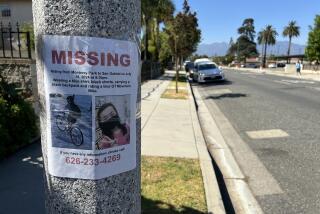Eglash Quits L.A. Inspector General’s Job
Jeffrey C. Eglash, the Los Angeles Police Commission’s inspector general, said Thursday that he has accepted an offer to work for a private law firm and will resign from his civilian watchdog position by the end of November.
Eglash, a former federal prosecutor, said he has made significant strides in strengthening the role and authority of the inspector general’s office during his 3 1/2 years on the job, but more still needs to be done to enhance civilian oversight of the historically insular Los Angeles Police Department.
“I feel like I’ve accomplished some good things here, but I’m anxious to get back to the practice of law,” Eglash said. “I’m looking for some new challenges.”
Eglash’s tenure as inspector general coincided with a turbulent time for the LAPD, marked by the Rampart corruption scandal and the subsequent insertion of a federal monitor to oversee sweeping reforms.
Eglash expanded the staff of the inspector general’s office from 12 to 32, spearheaded the commission’s investigation into the Rampart allegations, highlighted problems with departmental investigations into police shootings and produced numerous audits on discipline, use of force and other issues.
Joseph A. Gunn, the commission’s executive director, said he would miss working with Eglash, whom he described as a man of high integrity.
“He has a real passion for the job. He really believed in its mission,” Gunn said.
Commission President Rick Caruso said the panel plans a comprehensive search for Eglash’s replacement.
“We’re going to find the best person out there for this job,” Caruso said. “We’re going to start collecting resumes right away.”
Other city leaders praised Eglash’s efforts and said they were disappointed to see him leave.
“It is a tremendous loss for public safety and civil rights in Los Angeles,” said City Councilman Jack Weiss, who once worked with Eglash in the U.S. attorney’s office. “Jeff Eglash came into the inspector general’s position at a time when it had been marginalized and there were many who did not want that model of oversight to succeed. Through his hard work and innate fairness, he turned the ship around.”
Though he sought to maintain a low profile on the job, Eglash clashed frequently with department commanders, former Chief Bernard C. Parks and even his own commission bosses. Much of the tension centered on his access to information and authority to independently investigate complaints.
At times, he was excluded from LAPD meetings, even ones attended by commissioners or representatives from other city agencies.
“The working relationship was strained, but I think it’s improving,” Eglash said. “It’s still not to the point where I’d like it to be.”
Many of Eglash’s reports and findings put him at odds with Parks, forcing the five civilian police commissioners to choose between supporting their inspector general or supporting their chief.
The commission, in a 3-2 vote, sided with Eglash when they ruled that the 1999 fatal shooting of Margaret Mitchell, a homeless woman stopped by officers while trying to retrieve her shopping cart, had been unjustified. The chief said the shooting was within departmental rules.
Last year, a similarly divided commission rejected Eglash’s recommendations that Parks be disciplined for allegedly making false and misleading statements when he denied having withheld information on the Rampart scandal from the district attorney’s office.
“They didn’t always agree with us on every issue, but we were a voice and the voice was heard,” Eglash said.
His effectiveness as inspector general was, to some degree, limited by his poor relationship with the chief and other department officials.
Parks openly distrusted Eglash, refusing to talk to him or even shake his hand at meetings. The chief and his top commanders attempted to enlist the support of commission members several times when Eglash requested information that the department did not want released.
According to several LAPD observers, Eglash has grown weary of his battles with the department officials and has been looking for a new job for many months. At one point, he reportedly considered returning to the U.S. attorney’s office.
In the end, Eglash decided to join the Washington D.C.-based law firm of Howry, Simon, Arnold & White. He will work at the firm’s Los Angeles office.
Eglash said he plans to stay on until the end of next month to finish several projects, including an investigation into the LAPD’s handling of allegations that a deputy chief was involved in laundering money for the officer’s son’s multimillion-dollar drug-trafficking ring.
“I think Jeff did an excellent job, faced with monumental impediments and frustrations,” said Merrick Bobb, a consultant who monitors the Los Angeles County Sheriff’s Department. “I think it’s particularly sad that he’s leaving at this juncture, because I believe the new chief’s administration would have worked harder to establish a constructive relationship with the inspector general.”
The incoming chief, William J. Bratton, agreed.
“I’m personally disappointed that he is stepping away at this time,” said Bratton, adding that the department’s relationship with the inspector general’s office would improve significantly when he takes over because he believes there should be “more openness and cooperation.”
In an interview about his departure, Eglash said the federal consent decree, which mandates reforms for the department, has created a huge amount of work for his office, but has helped “cement the role of the I.G.’s office in a very positive way in the governance of the department.”
He said the consent decree has forced cooperation between the LAPD and the decree’s monitor.
“The idea is that, when the consent decree is over and the independent monitor goes away, the I.G.’s office will assume the role of the independent monitor,” Eglash said.
He said he supports an often-discussed proposal to make at least some of the commissioners’ jobs full-time, paid positions. And Eglash argued that it might be wise to have the inspector general report, not only to the commission, but also to the City Council. Finally, Eglash said, information about disciplining officers and other police matters should be much more public.
“I think civilian oversight is strong now,” Eglash said, “but it could be stronger.”
More to Read
Sign up for Essential California
The most important California stories and recommendations in your inbox every morning.
You may occasionally receive promotional content from the Los Angeles Times.







